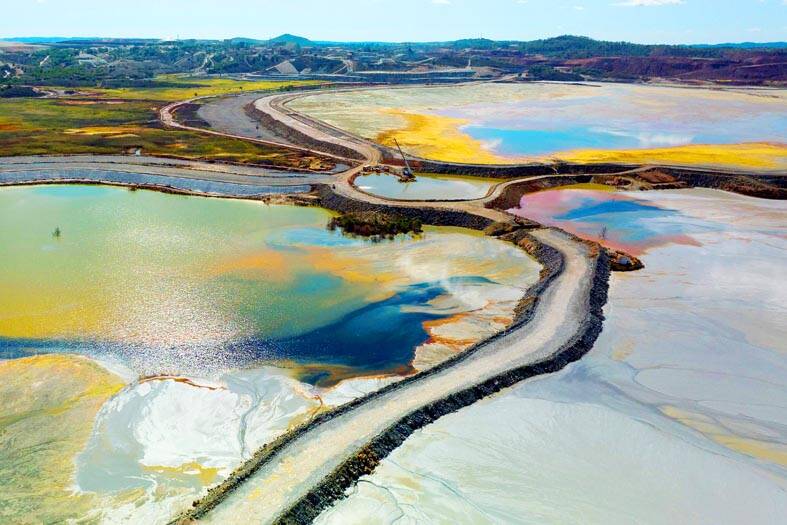Spain is aiming to tap its unexplored strategic mining resources as the EU urgently seeks to ramp up production, but local resistance could frustrate the government’s plans.
The European mining heavyweight has 2,600 mines generating 3.5 billion euros (US$3.79 billion) in annual revenue and is the second-largest EU producer of copper and magnesite, but sector specialists believe its potential is largely untapped.
“Spain possesses huge wealth in its subsoil” and “must continue investigating” to quantify it, said Ester Boixereu, a geologist and natural resources specialist at the Geological and Mining Institute of Spain.

Photo: AFP
Deposits of lithium, cobalt, tungsten, nickel and rare earths have been discovered in the south and west of the country over the past few years.
Their strategic value has soared as the green energy and technology races have gathered pace, because they are critical in the construction of electric-battery cars, wind turbines and smartphones.
The EU is anxious to turbocharge production of these resources to reduce its dependence on external suppliers, particularly China, which dominates much of the market for renewable energy equipment.
This month, the Spanish Ministry for the Ecological Transition and the Demographic Challenge presented a national mining programme at the behest of Brussels aimed at identifying minerals present in new deposits and existing quarries.
The plan opens a path to reforming a 50-year-old mining law and would “strengthen national and European strategic autonomy” in an “increasingly complex geopolitical context,” Spanish Secretary of State for Energy Joan Groizard said.
The sector has long been waiting for such assistance.
“Mining is a pillar we neglected for a long time,” Spanish Minister for the Ecological Transition Sara Aagesen said in an address to the Spanish Senate last month.
About 30 operating requests have been submitted over the past few years, notably in the central Castilla-La Mancha region where the company Quantum Mineria has identified rare earths.
In Extremadura in the west, several firms hope to extract lithium, a key material for electric-vehicle batteries.
Some of the applications “are advancing very well” but others “remain blocked,” said Vicente Gutierrez Peinador, president of the national confederation of mining and metallurgy businesses.
He pointed to a lack of coordination between levels of government and a “lack of political will” at the regional level, where permits are granted, rather than in Madrid.
That reticence comes from local populations who worry about the environmental impact of mining projects, which sometimes require chemical products to extract the precious metals, raising pollution fears.
They also guzzle huge amounts of water — a major concern in a country that has endured years of drought and faces increasing desertification and fiercer heatwaves as climate change accelerates.
A bonanza in the sector would “increase the probability of accidents and worsen the environmental and social impact inherent to extractive activity,” Friends of the Earth said, denouncing a “lack of transparency” from the authorities.
Mining specialist Boixereu nuanced green groups’ criticism, saying mining was now “much better regulated” compared with past operations that paid scant attention to the environment.
Sector representative Gutierrez Peinador believes the new government programme “is going in the right direction,” but remained cautious, because the corresponding credits have not been announced.

SEMICONDUCTOR SERVICES: A company executive said that Taiwanese firms must think about how to participate in global supply chains and lift their competitiveness Taiwan Semiconductor Manufacturing Co (TSMC, 台積電) yesterday said it expects to launch its first multifunctional service center in Pingtung County in the middle of 2027, in a bid to foster a resilient high-tech facility construction ecosystem. TSMC broached the idea of creating a center two or three years ago when it started building new manufacturing capacity in the US and Japan, the company said. The center, dubbed an “ecosystem park,” would assist local manufacturing facility construction partners to upgrade their capabilities and secure more deals from other global chipmakers such as Intel Corp, Micron Technology Inc and Infineon Technologies AG, TSMC said. It

NO BREAKTHROUGH? More substantial ‘deliverables,’ such as tariff reductions, would likely be saved for a meeting between Trump and Xi later this year, a trade expert said China launched two probes targeting the US semiconductor sector on Saturday ahead of talks between the two nations in Spain this week on trade, national security and the ownership of social media platform TikTok. China’s Ministry of Commerce announced an anti-dumping investigation into certain analog integrated circuits (ICs) imported from the US. The investigation is to target some commodity interface ICs and gate driver ICs, which are commonly made by US companies such as Texas Instruments Inc and ON Semiconductor Corp. The ministry also announced an anti-discrimination probe into US measures against China’s chip sector. US measures such as export curbs and tariffs

The US on Friday penalized two Chinese firms that acquired US chipmaking equipment for China’s top chipmaker, Semiconductor Manufacturing International Corp (SMIC, 中芯國際), including them among 32 entities that were added to the US Department of Commerce’s restricted trade list, a US government posting showed. Twenty-three of the 32 are in China. GMC Semiconductor Technology (Wuxi) Co (吉姆西半導體科技) and Jicun Semiconductor Technology (Shanghai) Co (吉存半導體科技) were placed on the list, formally known as the Entity List, for acquiring equipment for SMIC Northern Integrated Circuit Manufacturing (Beijing) Corp (中芯北方積體電路) and Semiconductor Manufacturing International (Beijing) Corp (中芯北京), the US Federal Register posting said. The

India’s ban of online money-based games could drive addicts to unregulated apps and offshore platforms that pose new financial and social risks, fantasy-sports gaming experts say. Indian Prime Minister Narendra Modi’s government banned real-money online games late last month, citing financial losses and addiction, leading to a shutdown of many apps offering paid fantasy cricket, rummy and poker games. “Many will move to offshore platforms, because of the addictive nature — they will find alternate means to get that dopamine hit,” said Viren Hemrajani, a Mumbai-based fantasy cricket analyst. “It [also] leads to fraud and scams, because everything is now